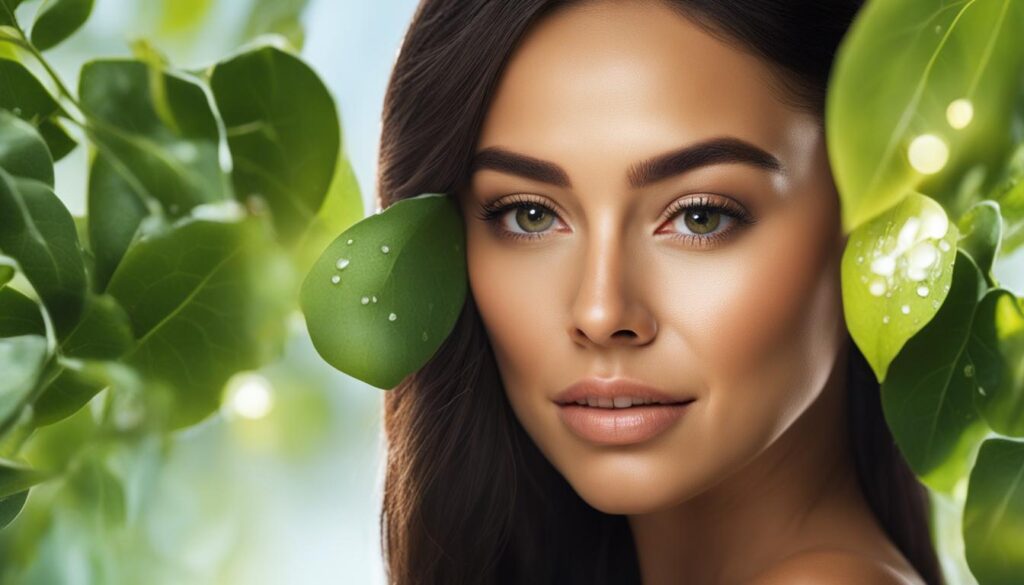Welcome to my expert insights on Zinc Ricinoleate and its benefits for the skin. As a skincare professional, I have extensively studied and researched the uses of Zinc Ricinoleate in skincare products. This powerful ingredient offers a range of advantages, from its odor control properties to its ability to hydrate and protect the skin.
Zinc Ricinoleate is commonly used in deodorant products due to its effectiveness in combating unpleasant odors. It acts as a natural deodorizer, neutralizing odor-causing compounds and keeping you feeling fresh throughout the day. Moreover, it is safe for use in skincare products, providing a gentle and effective solution for odor control.
However, Zinc Ricinoleate is not limited to deodorants alone. It also offers antioxidant and antimicrobial properties, making it a valuable ingredient in skincare formulations. This ingredient helps protect the skin from environmental stressors and maintains a healthy, balanced complexion. It has also been found to be hydrating, which is essential for maintaining skin moisture and preventing dryness.
It’s important to note that while Zinc Ricinoleate is safe for use in skincare, caution should be exercised when ingesting it as a laxative. It’s always advisable to consult with a dermatology provider before incorporating this ingredient into your skincare routine.
Key Takeaways:
- Zinc Ricinoleate is commonly used in deodorant products for odor control.
- It has antioxidant, antimicrobial, and hydrating properties, making it an effective skincare ingredient.
- Consulting a dermatology provider is recommended before using Zinc Ricinoleate in your skincare routine.
- It is safe for topical use, but caution should be exercised when ingesting it as a laxative.
- Zinc Ricinoleate offers a natural deodorizing effect and is a versatile addition to skincare formulations.
What is Castor Oil and its Role in Skincare?
Castor oil, derived from the seeds of the castor oil plant, is a vegetable oil with a range of skincare benefits. It contains fatty acids, including ricinoleic acid, which provide moisturizing and antioxidant properties for the skin.
In the realm of skincare, castor oil has been highly regarded for its ability to reduce inflammation, combat acne-causing bacteria, and enhance skin softness and hydration. Its moisturizing properties help to replenish and nourish the skin, making it an excellent addition to skincare routines.
Furthermore, castor oil can also be effective in soothing dandruff and promoting hair growth, making it a versatile ingredient in both skincare and haircare products.
However, it is essential to exercise caution when using castor oil. Ingesting or using it in high concentrations may lead to potential side effects. As with any skincare ingredient, it is always advisable to perform a patch test and consult with a dermatology provider before incorporating castor oil into your skincare regimen.

| Benefits of Castor Oil in Skincare |
|---|
| Moisturizing |
| Reduces inflammation |
| Antioxidant properties |
| Combat acne-causing bacteria |
| Enhances skin softness and hydration |
| Soothing for dandruff |
| Promotes hair growth |
The Benefits of Castor Oil for Skin
Castor oil offers several benefits for the skin. It has anti-inflammatory properties that can help reduce inflammation and soothe irritated skin. Additionally, its antimicrobial properties make it effective in fighting acne-causing bacteria and reducing the appearance of pimples.
Castor oil can also improve skin softness and hydration, making it an excellent moisturizing ingredient. Furthermore, it can be used to moisturize the scalp and help soothe dandruff.
Reducing Inflammation
The anti-inflammatory properties of castor oil can be attributed to its high concentration of ricinoleic acid. This fatty acid helps calm inflammation and reduce redness in the skin.
Fighting Acne
Castor oil’s antimicrobial properties make it a valuable ingredient in the treatment of acne. It can help kill the bacteria that cause breakouts and decrease the severity of pimples.
“Castor oil’s antimicrobial properties make it a valuable ingredient in the treatment of acne.”
Improving Skin Softness and Hydration
Applying castor oil to the skin can improve its softness and hydration levels. It creates a protective barrier that locks in moisture, leaving the skin feeling smooth and supple.
Soothing Dandruff
When applied to the scalp, castor oil can help moisturize dry, flaky skin and reduce the occurrence of dandruff. Its hydrating properties can soothe itchiness and minimize scalp irritation.
It is important to note that individual results may vary depending on skin type and other factors. Before incorporating castor oil into your skincare routine, it is recommended to consult a dermatology provider.

| Benefit | Description |
|---|---|
| Reduces inflammation | Calms irritated skin and reduces redness |
| Fights acne | Helps eliminate acne-causing bacteria and reduces pimples |
| Improves skin softness and hydration | Creates a protective barrier and locks in moisture |
| Soothes dandruff | Moisturizes the scalp and reduces flakiness |
Using Castor Oil in Skincare Products
Castor oil is a versatile ingredient that can be found in various skincare products, including serums, oils, and creams. With its high content of fatty acids, castor oil serves as a moisturizing and stabilizing agent, delivering numerous benefits to the skin.
One of the key advantages of using castor oil in skincare is its moisturizing properties. This natural oil effectively hydrates and nourishes the skin, helping to prevent dryness and maintain a healthy moisture balance. By locking in moisture, castor oil helps improve the skin’s texture, leaving it soft, smooth, and supple.
In addition to its moisturizing benefits, castor oil also helps maintain a healthy skin barrier. The fatty acids in castor oil form a protective layer on the skin’s surface, shielding it from environmental aggressors and preventing moisture loss. This barrier-enhancing effect contributes to overall skin health and resilience.
Suggested Read: The Best Skincare Products with Castor Oil
When incorporating castor oil into skincare products, it is important to note that its texture can be thick and sticky. To avoid this, it is recommended to dilute castor oil with other oils, such as jojoba oil or almond oil. This not only improves the texture of the product but also allows for easier application and absorption into the skin.
Prior to using skincare products containing castor oil, it is advisable to perform a patch test. Apply a small amount of the product to a small area of skin and monitor for any signs of irritation or allergic reactions. This precautionary step helps ensure that castor oil is well-tolerated by your skin.
“Castor oil’s moisturizing and barrier-enhancing properties make it a valuable ingredient in skincare products. Its ability to hydrate and nourish the skin, coupled with its protective effects, contributes to a healthy and radiant complexion.”
Overall, incorporating castor oil into skincare products can provide multiple benefits for the skin, including moisturization, texture improvement, and barrier support. However, individual results may vary, and it is always recommended to consult with a dermatology provider to determine the best skincare routine and product selection for your specific needs.

| Benefits of Using Castor Oil in Skincare Products | How to Use Castor Oil in Skincare Products |
|---|---|
|
|
Safety Considerations for Using Castor Oil on the Skin
When incorporating castor oil into your skincare routine, it’s important to be aware of certain safety considerations. While castor oil is generally safe for use on the skin, there are some factors to keep in mind to ensure a positive experience.
Pregnancy and Castor Oil
Pregnant individuals should exercise caution when using castor oil. When ingested, castor oil has been known to potentially cause premature contractions, which can be harmful during pregnancy. Therefore, it is advisable to avoid using castor oil internally or consult with a healthcare professional before considering any usage during pregnancy.
Side Effects and Allergic Reactions
When used as a laxative, castor oil may have side effects such as abdominal cramps, vomiting, and diarrhea. However, when it comes to topical application, the most common concern is the potential for allergic contact dermatitis and skin irritation.
To determine if you have any sensitivity to castor oil, it is recommended to perform a patch test before using any skincare product containing the ingredient. Apply a small amount of the product to a discreet area of skin, such as the inner forearm, and observe for any adverse reactions such as redness, itching, or swelling. If any negative reactions occur, discontinue use immediately and consult with a dermatology provider.
Side Effects and Safety Considerations of Castor Oil on the Skin
| Consideration | Details |
|---|---|
| Pregnancy | Pregnant individuals should avoid the internal use of castor oil, as it may potentially cause premature contractions. |
| Side Effects | When used as a laxative, castor oil may cause abdominal cramps, vomiting, and other digestive side effects. |
| Allergic Reactions | Castor oil can cause allergic contact dermatitis and skin irritation in some individuals. Patch testing is recommended before using any castor oil-containing product. |
It’s always important to prioritize your safety and well-being when it comes to skincare. If you have any concerns or questions about using castor oil on your skin, consult with a dermatology provider for personalized guidance.
The Effectiveness of Castor Oil in Skincare
Castor oil is hailed for its effectiveness in skincare due to its moisturizing, anti-inflammatory, and antimicrobial properties. Its unique composition makes it a versatile ingredient that can provide numerous benefits to the skin.
When it comes to moisturizing the skin, castor oil shines. Its rich concentration of fatty acids, particularly ricinoleic acid, helps to deeply hydrate and nourish the skin, leaving it soft and supple. This moisturizing effect can also help improve skin texture, making it smoother and more radiant.
But castor oil doesn’t just stop at hydration. It is also known for its anti-inflammatory properties, which can help calm irritated and inflamed skin. Whether you’re dealing with redness, itchiness, or acne, castor oil can help reduce inflammation and promote a healthier complexion.
In addition, castor oil possesses antimicrobial properties that can aid in fighting off bacteria and other harmful microorganisms. This makes it particularly beneficial for individuals with acne-prone skin, as it can help keep breakouts at bay and reduce the appearance of blemishes.
However, it’s important to note that individual results may vary when using castor oil in skincare. Factors such as skin type and sensitivity can influence the effectiveness of this ingredient. It’s always best to perform a patch test before incorporating castor oil into your skincare routine to ensure compatibility and avoid any potential adverse reactions.
Overall, castor oil has proven to be a valuable asset in skincare. Its moisturizing, anti-inflammatory, and antimicrobial properties make it an effective ingredient in various skincare products.
“Castor oil’s moisturizing and anti-inflammatory properties can help hydrate and soothe the skin, while its antimicrobial properties combat acne-causing bacteria.”
The Effectiveness of Castor Oil in Skincare – Key Takeaways
- Castor oil is effective in skincare due to its moisturizing, anti-inflammatory, and antimicrobial properties.
- It deeply hydrates the skin, improves texture, and promotes a healthy complexion.
- Castor oil reduces inflammation, making it beneficial for calming irritated skin.
- Its antimicrobial properties help fight acne-causing bacteria and reduce blemishes.
- Individual results may vary, so it’s recommended to perform a patch test before use.
| Benefits of Castor Oil in Skincare | How It Works |
|---|---|
| Moisturizes the skin | The fatty acids in castor oil provide deep hydration and nourishment. |
| Reduces inflammation | Castor oil’s anti-inflammatory properties calm irritated skin. |
| Fights acne-causing bacteria | Its antimicrobial properties help combat blemishes and breakouts. |
The Pros and Cons of Making Your Own Sunscreen
Making homemade sunscreen is not recommended due to several reasons. It can be difficult and expensive to create a sunscreen that provides effective sun protection. Zinc oxide, a common ingredient in sunscreen, can be challenging to formulate and may result in inconsistent SPF levels. Proper testing and knowledge of formulation techniques are required to create a safe and effective sunscreen.
Additionally, commercial sunscreens undergo rigorous testing to ensure their safety and efficacy. It is best to rely on commercially available sunscreen products for adequate sun protection.
| Pros | Cons |
|---|---|
|
|
Creating a homemade sunscreen can be tempting, but it’s important to consider the potential risks and limitations. While the idea of customizing your own sunscreen may sound appealing, it is crucial to prioritize safety and effectiveness when it comes to sun protection.
Commercially available sunscreens have undergone extensive testing to ensure they provide adequate SPF and protection against harmful UVA and UVB rays. They are formulated with specific ingredients that are proven to be effective in shielding the skin from sun damage. Trusting trusted brands and following their application instructions is the best way to protect your skin from the sun’s harmful rays.
| Homemade Sunscreen | Commercial Sunscreen |
|---|---|
|
|
While making your own sunscreen may seem like a fun and cost-effective solution, it is essential to prioritize the protection and health of your skin. Utilizing commercially available sunscreens that have been thoroughly tested can provide you with the confidence and peace of mind that your skin is adequately shielded from the sun.
Conclusion
When it comes to sun protection and skincare, homemade sunscreen may seem like an appealing option for its potential cost-effectiveness. However, it is important to consider the challenges and risks associated with creating your own sunscreen. Commercial skincare products, on the other hand, have undergone extensive testing and formulation processes to ensure their safety and efficacy.
Skincare products that contain ingredients like zinc ricinoleate and castor oil offer numerous benefits for the skin. They have been carefully developed to provide effective sun protection, hydration, and other skincare benefits. By prioritizing the use of commercially available sunscreen products, you can ensure that you are getting adequate SPF coverage that has been thoroughly tested.
Consultation with a dermatology provider is always recommended to determine the best skincare routine and product selection for your individual needs. They can provide expert guidance and help you choose the right skincare products that align with your skin type, concerns, and sun protection requirements. When it comes to protecting your skin from the harmful effects of the sun, it is crucial to rely on proven and tested skincare solutions.
FAQ
What are the benefits of Zinc Ricinoleate for the skin?
Zinc Ricinoleate has odor control properties and is commonly used in deodorant products. It also has antioxidant, antimicrobial, and hydrating properties, making it effective in skincare products.
Is Zinc Ricinoleate safe for use in skincare?
Zinc Ricinoleate is safe for use in skincare but caution should be exercised when ingesting it as a laxative. It is important to consult a dermatology provider before incorporating Zinc Ricinoleate into your skincare routine.
What is Castor Oil and how does it benefit the skin?
Castor oil is a vegetable oil derived from the seeds of the castor oil plant. It contains fatty acids that provide moisturizing and antioxidant benefits to the skin. Castor oil can reduce inflammation, fight acne-causing bacteria, increase skin softness, and hydrate the skin.
What are the uses of Castor Oil in skincare products?
Castor oil can be found in a variety of skincare products including serums, oils, and creams. It is commonly used as a moisturizing and stabilizing ingredient due to its high fatty acid content. Castor oil can provide hydration, improve skin texture, and maintain a healthy skin barrier.
Are there any safety considerations when using Castor Oil on the skin?
While Castor oil is generally safe for use on the skin, pregnant individuals may want to avoid using it as it can potentially cause premature contractions if ingested. Castor oil may also cause abdominal cramps, vomiting, and allergic contact dermatitis in some cases. Patch testing is recommended to check for any potential skin reactions.
How effective is Castor Oil in skincare?
Castor oil has been shown to be effective in skincare due to its moisturizing, anti-inflammatory, and antimicrobial properties. It can hydrate the skin, improve skin texture, and reduce inflammation. However, individual results may vary, and it is important to consider factors such as skin type and sensitivity.
What are the pros and cons of making homemade sunscreen?
Making homemade sunscreen is not recommended as it can be challenging and expensive to create a sunscreen that provides effective sun protection. Commercial sunscreens undergo rigorous testing to ensure their safety and efficacy. It is best to rely on commercially available sunscreen products for adequate sun protection.
What is the conclusion regarding homemade sunscreen and skincare products?
It is recommended to prioritize sun protection by using commercially available sunscreen products that provide adequate SPF coverage. Commercial skincare products, including those containing Zinc Ricinoleate and Castor Oil, have undergone extensive testing and formulation processes to ensure their safety and efficacy.






